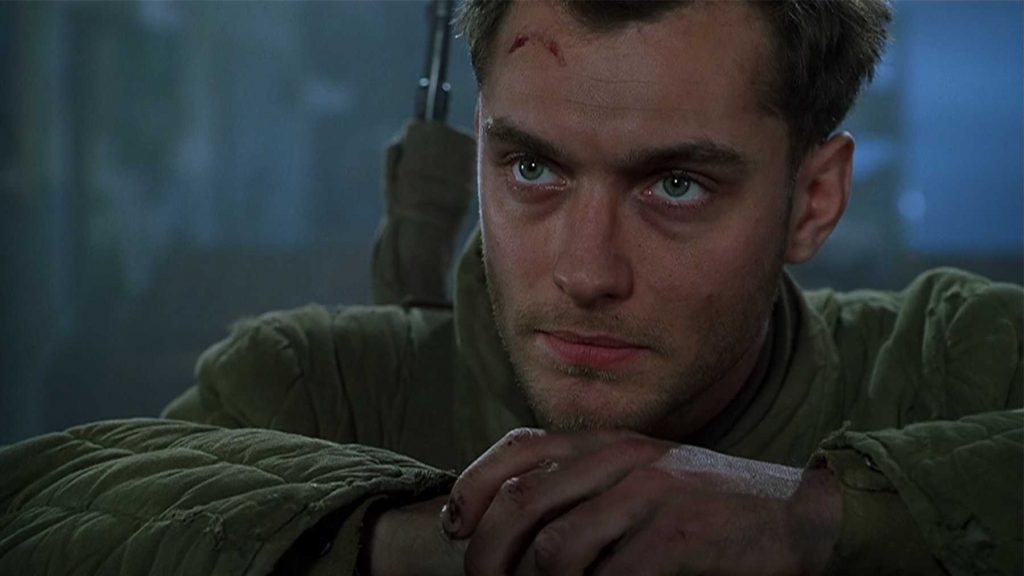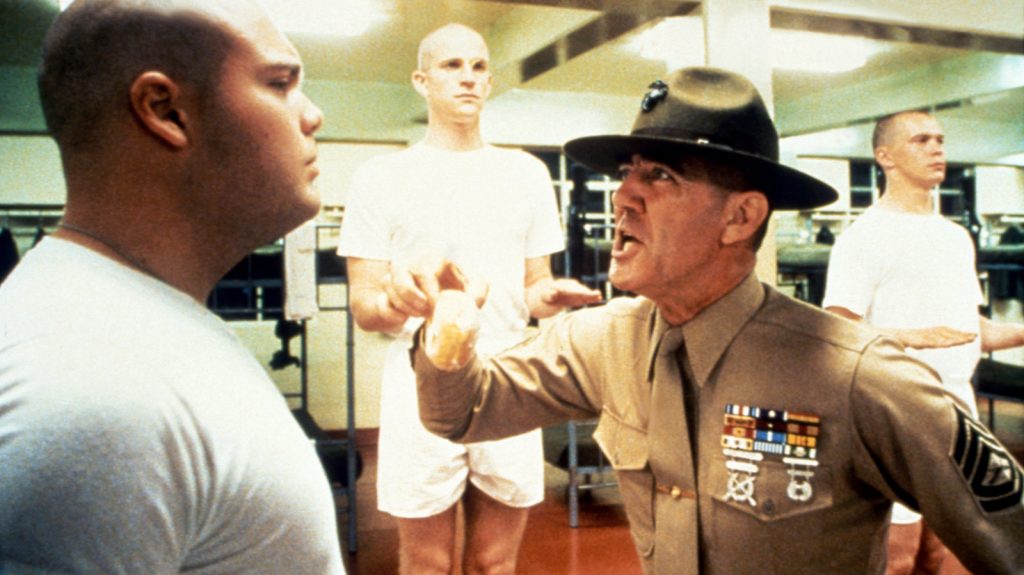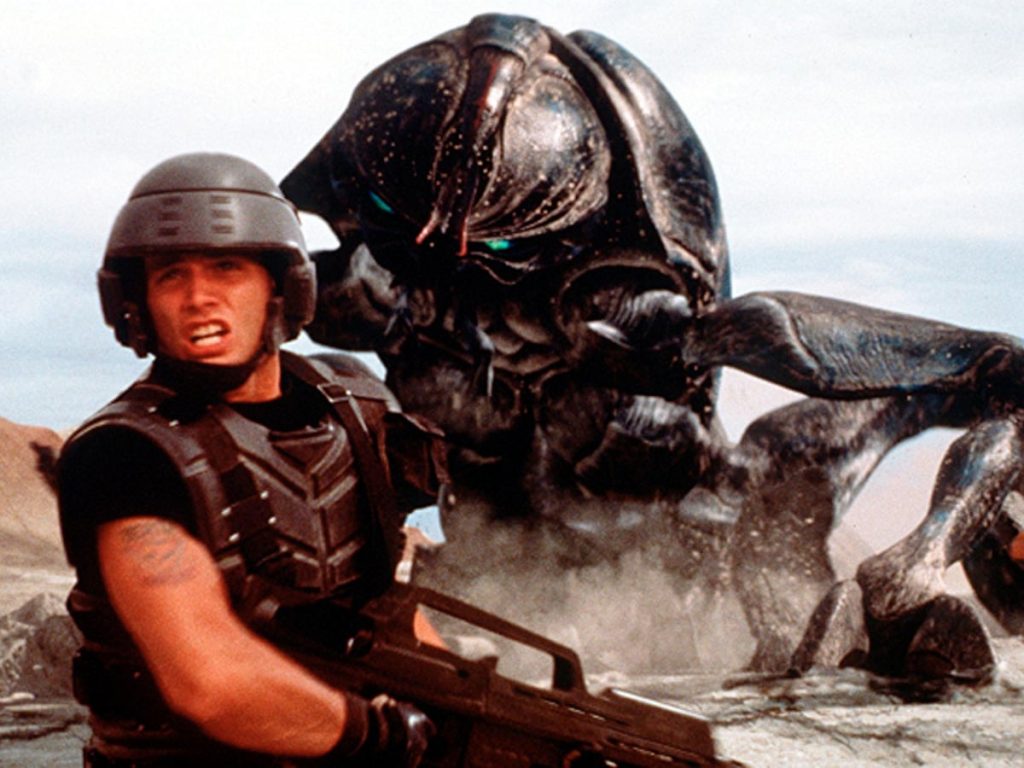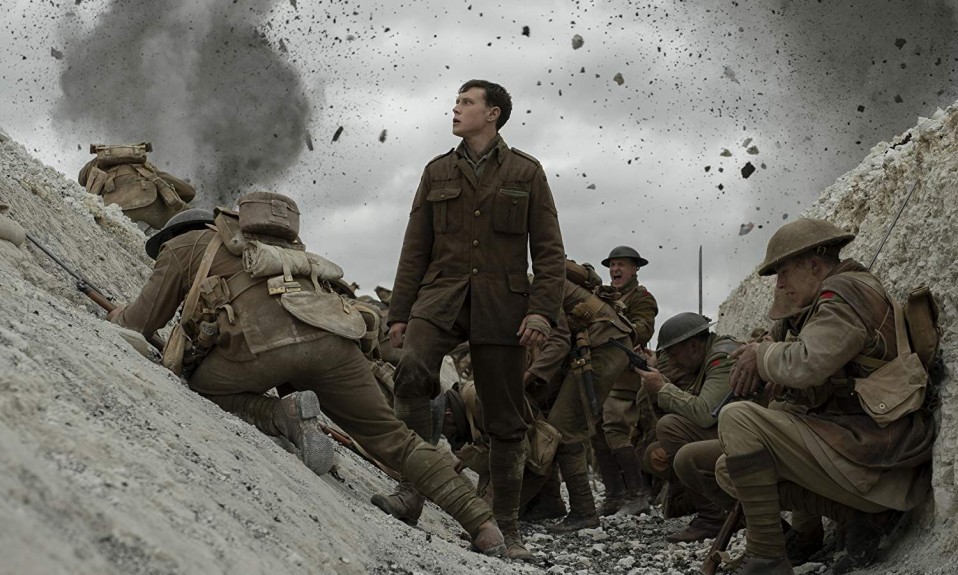Films about war are one of the most popular and successful genres of film, winning Oscars, getting huge audiences and being some of the most memorable films ever made. The purposes of these films vary dramatically from over-the-top military worship like Top Gun to attempts to show the horror of war like Platoon to sometimes telling the stories of people in terrible situations.
World War Two – Enemy At The Gates

World War Two dominates this genre, not only is it the largest military conflict ever it is relatively recent and happened whilst movies were being made – Casablanca was released whilst the war was still going on. Saving Private Ryan’s opening of the assault on Normandy is often held up as the one of the best examples of film accurately depicting actual combat and is genuinely harrowing. Enemy at the Gates is one of the few English language World War Two films that looks at the conflict and doesn’t include any Americans or British forces. The film is about the terrible siege of Stalingrad in which the German and Russian forces fought for control of the city for nearly seven months with around 2 million casualties. The film focuses on the story of a sniper battle between Russian soldier Vassili and German soldier Major Konig. Vassili becomes a hero to the Russians, at a time when they badly need any good news, and Konig is brought in to kill him. As well as showing the utter devastation the battle caused the film portrays the propaganda battle going on behind the front lines. It is an interesting film as well in that neither side is shown as the good guys – certainly the Russians are defending against the invading Germans but the Soviet government is heavily criticised. On Vassili’s arrival in the city he is immediately thrown into combat but without a weapon, told to take one when the soldier next to them dies, then as they prepare to charge the Germans they are told if they retreat other Russian soldiers will shoot them – not exactly inspiring. There are glimpses into what Stalinist Russia is like and they are very unpleasant.
The Vietnam War – Full Metal Jacket

Stanley Kubrick has made more than one contribution to this genre but perhaps most famously with Full Metal Jacket – damning not only the Vietnam War but much of the idea of war. The film is essentially in two halves – the first half shows marines in boot camp, the second half following one of the marines – Joker – to Vietnam. Certainly the first half is the more famous, showing the inhuman treatment of the marines by their drill sergeant and military authorities in general. The drill sergeant was played by R. Lee Ermey (a real-life former drill sergeant) and has become the default of drill sergeants in popular culture. The punishment inflicted on the recruits is truly astonishing – ranging from cruel mockery and psychological torture to effectively encouraging recruits to beat their comrades. The worst of the cruelty is focused on Pyle, one of the less able recruits, who ultimately loses his mind and kills the sergeant who has tormented him. The film The Men Who Stare At Goats cites an interesting statistic – only 15 to 20 percent of new recruits will actually fire on the enemy when entering combat (despite their own lives being in danger), seemingly showing that people don’t want to kill other people. Full Metal Jacket is a film that understands that lesson and Ermey’s sergeant is trying to beat the humanity out of the recruits. The second half of the film showing Joker in the war demonstrates what comes of this treatment, for example, at one point a gunner on a helicopter randomly shooting Vietnamese people as they fly by, making jokes whilst he kills them.
Science Fiction – Starship Troopers

War films are not just confined to historical conflicts or even semi-fictionalised ones that have a very real-life setting, you get sci-fi and fantasy war films too. I watched Starship Troopers at a young age and a lot of what was going on with that film went over my head, I thought it was a cool sci-fi film. Watching it subsequently it is a satirical gem about the awfulness of war. In this film it’s humans versus alien bugs and so any idea of coming to terms with the enemy is abandoned – this is pretty much extermination. Populated by a cast of extremely good-looking people living in what is revealed to be something akin to a fascist society saturated with government propaganda. We follow three school-friends as each goes into a different branch of the military – infantry, navy (meaning spaceships) and intelligence. The film has sensational battle scenes and excellent special effects for the time making the alien bugs very believable. There is an awful grinding relentless to the fighting and you get the feeling that this is a war that is never going to end. The most memorable scene, however, is when the new recruits discuss why they joined the army, some wanting a career, some to do good, but what it comes out is one character wants to have children and another wants to go into politics – and without joining the army, neither of these goals are possible. This reveals a chilling insight into their world, especially as this passes without comment from anyone else.
Why Do We Make War Films?

So war films are big business – huge commercial successes and often hailed as some of the best films ever made. But what is the point of war films, why do we make them? That war is hell is a cliche but it is also true, why we do we want to watch hell? Something like Saving Private Ryan which can show the horrible savagery of what happens can be very useful. Most films on the Vietnam War are very critical – questioning why America joined the war, their use of chemical weapons, the impact on innocent civilians. Set during World War One Wonder Woman did an excellent job of capturing the absolute futility and pointlessness of it all – generals who did not care for the lives of their soldiers, regiments that had spent years fighting barely advanced. Sadly though things aren’t that simple and not all war films portray war in these terms. There is often a romanticism of war, of the nobility of warfare and conflict, and in some films war is simply cool.
Top Gun famously lead to a recruiting boom for the US navy with recruitment booths set up outside cinemas, now whether you see that as good or bad is a matter of opinion but what I think is perhaps the most striking thing about Top Gun is the people the pilots are fighting are never identified. The enemy aircraft are MiGs, a Soviet design, but they aren’t Russians, if the enemy in a war film is not even identified, then there is an awful feeling that “our side” must always be in the right.
Even if films are explicitly antiwar things can get complicated – Apocalypse Now is a damning critique of the Vietnam War but the famous Ride of the Valkyries scene has been referenced numerous times in other films and culture and it’s interpreted in different ways – in Gulf war film Jarhead, the marines have a screening of Apocalypse Now in which there is almost a standing ovation for this scene, with cheering and yelling as innocent civilians are killed. There is a famous quote usually attributed to French filmmaker Francois Truffaut “There is no such thing as an anti-war film” in which he seems to be saying that whatever the motivation of the filmmaker they will inevitably make war look heroic and be glorifying the conflict.
War films can tell huge, epic and tragic stories and they can be everything from summer blockbusters to indie think-pieces. They have been, and will continue to be, a huge part of cinema, not every war film needs to be an angry denunciation of war but a filmmaker should think carefully about the story they are telling.
Also Read: Da 5 Bloods (Review)













